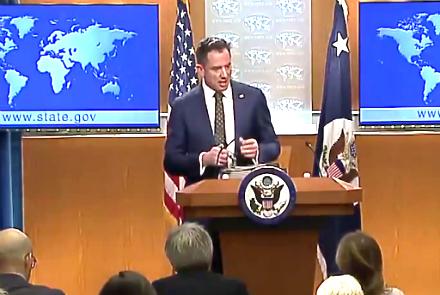The US Department of State said the Taliban in talks with the US negotiators have agreed that peace will require both sides to fully address four core issues, including counterterrorism assurances, troop withdrawal, intra-Afghan dialogue, and a comprehensive ceasefire.
“We’ve received reports back from Special Representative Khalilzad that they’ve had meaningful progress,” Robert Palladino, the State Department’s deputy spokesperson, told reporters at a daily briefing in Washington on Tuesday.
He said that in the fresh round of talks, the two sides were able to move to agreement in draft on the first two principles.
“In this round of talks, we were able to move to agreement in draft on the first two principles, counterterrorism assurances and troop withdrawal. And when that agreement in draft is finalized, Taliban and an inclusive Afghan negotiating team that includes the Afghan government and other Afghans to begin intra-Afghan negotiation for a political settlement and a comprehensive ceasefire,” he added.
Hours after the news broke on Qatar talks, US Special Envoy Zalmay Khalilzad said in a tweet that he wrapped up a marathon round of talks with Taliban in Doha.
Khalilzad said peace requires agreement on four issues: counterterrorism assurances, troop withdrawal, intra-Afghan dialogue, and a comprehensive ceasefire.
“In January talks, we “agreed in principle” on these four elements. We’re now “agreed in draft” on the first two,” he said in a tweet.
He said the conditions for peace have improved and that it is clear all sides want to end the war. “Despite ups and downs, we kept things on track and made real strides,” he said.
Khalilzad said when the agreement in draft about a withdrawal timeline and effective counterterrorism measures is finalized, the Taliban and other Afghans, including the government, will begin intra-Afghan negotiations on a political settlement and comprehensive ceasefire.
“My next step is discussions in Washington and consultations with other partners. We will meet again soon, and there is no final agreement until everything is agreed,” Khalilzad concluded.
Pallandino said Special Representative Zalmay Khalilzad will be returning to Washington and he will be consulting with secretary Pompeo as well as the inter-agency and also partner countries in this process.
“Much works need to be done. As special representative Khalilzad has said nothing is agreed until everything is agreed,” Palladino added.
Later on the Taliban said in a statement that the United States and Taliban had deep discussions on two issues agreed in January.
The group said no deal has been signed by the negotiating teams and that they will come together after consulting their leaderships about the current developments.
Sources meanwhile said the US and the Taliban also held talks on some other issues including the dissolution of the Bilateral Security Agreement (BSA) between Afghanistan and the US (an agreement which allows US to stay in the country post-2014), the protection of foreign military installations, keeping the military equipment and a non-interference policy by the US and regional countries in Afghanistan’s internal affairs.
Meanwhile, a meeting between a number of Afghan politicians and the Taliban, which was expected to be held in the next two weeks, has been delayed.
“The draft agreement is expected to be signed very soon between the US and Taliban representatives in the presence of international community and some other countries, but the (Afghan) government will not be there,” said Nazar Mohammad Mutmaen, a political analyst in Kabul.
“The most effective team for peace talks is the team which we saw in Moscow. This team will soon meet the Taliban in Qatar,” said Faiz Mohammad Zaland, political analyst.
Although it has been stressed over different occasions for an inclusive Afghan peace negotiation team to be formed for talking the Taliban, but no change has so far occurred in the structure of the Afghan negotiating team.
“Government this time is ready to lead an inclusive delegation consisting of the political parties if the talks are supposed to start,” said Mujib Rahman Rahimi, spokesman for Chief Executive Abdullah Abdullah.
“The talks are now in their sensitive stage. I think time should be given to government to establish an inclusive team after holding consultations with the political parties and civil society institutions,” said Khalil Safai, political analyst.
Some Kabul residents said it is their right to be aware of the details of the peace talks.
“We have the right to be aware of the talks and their details,” said Fraidoon, a Kabul resident.
“There should a guarantee for any agreement,” said Wali, a Kabul resident.

